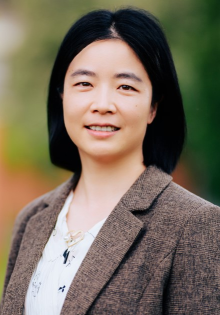Interview with postdoctoral fellow Dr. Ying Pan for nationwide ?Hydrogen Week“
Wasserstoff gilt als Hoffnungstr?ger der Zukunft. Die Herstellung ben?tigt allerdings sehr viel Energie. Denn Wasserstoff ist ein Gas, das in der Natur nur gebunden vorkommt – zum Beispiel in Wasser. Um es nutzen zu k?nnen, muss es aus dieser Verbindung gel?st werden. Naturwissenschaftlerin Dr. Ying Pan forscht daran, wie das ohne den Einsatz von Strom funktionieren kann und hat dafür 2023 das Postdoc-Stipendium der Universit?t Paderborn erhalten. Im Interview spricht sie über ihr Vorhaben, die Herausforderungen und über das Leben und Arbeiten in Paderborn.
Dr. Pan, you have been conducting research at Paderborn University for almost a year now. Your work focuses on innovative strategies to produce hydrogen without using electricity. Why do we need such methods, and how can they help address energy shortages?
Currently, over 95 percent of hydrogen production relies on fossil fuels. Nations and industries are investing heavily in new green energy technologies to achieve their goals of reducing emissions and protecting the environment. However, widely used methods like electricity or solar energy face practical challenges, including a heavy dependence on precious metal-based catalysts, high electricity consumption, and low yields of green chemical fuels and oxidants. Therefore, there is a pressing need for more cost-effective, innovative, and eco-friendly techniques in this field.
The piezocatalytic approach can harness mechanical energy, even from environmental vibrations caused by noise, wind, flowing water, or water waves. This method could offer a new way to reuse waste mechanical energy through energy conversion and storage, sensors, actuators, and environmental remediation techniques.
Could you explain to laypeople what this means exactly and how this process might work?
Essentially, the technique we are studying involves producing green fuels and chemicals from water by simply subjecting the water solution to mechanical vibrations. This technique is called piezocatalysis. This process utilizes the piezoelectric effect of dielectric materials (the catalysts). The crucial aspect of this technique is finding the right catalyst system that can convert mechanical energy into electrical energy.
What challenges have you encountered in your research project so far?
One of the biggest advantages of piezocatalysis is its independence from precious metal-based materials. The best catalysts for this technique are inexpensive semiconductors like zinc oxide or carbon-based materials, making them more feasible for large-scale production. However, like other promising hydrogen production techniques, piezocatalysis faces challenges such as low catalyst efficiency, resulting in a low production rate of green fuels and chemicals. Another unique challenge for this technique is the limited variety of catalyst systems available. We need to not only improve the efficiency of the existing catalyst systems but also explore new ones to expand the library of piezocatalyst systems.
You earned your PhD at the University of New South Wales in Sydney, and prior to that, you worked at the Chinese Academy of Sciences in Shanghai. How has this international perspective influenced your work, and what brought you to Paderborn University?
Thanks to my international education and work experience, I've become more adaptable to new challenges and opportunities. This background has facilitated my quick adjustment to the academic landscape in Germany and has allowed me to establish a broader international network for my research. My decision to join Paderborn University stemmed from the strong academic reputation of German universities and the exciting research opportunities available in green energy within Jun. Prof. Lopez Salas's group. After almost a year here, I’ve come to appreciate the vibrant atmosphere and rich cultural life of this city, both within my work environment and in daily life.
To what extent do you receive support as an early-career scientist from Paderborn University, and what are your prospects for the coming years?
I am currently supported by a postdoctoral fellowship from Paderborn University, which allows me to conduct my research here. I also receive strong support from Jun. Prof. Lopez Salas's group in the Department of Chemistry provides all the necessary facilities. Moreover, Paderborn University offers a wealth of free resources for career development, which has been immensely beneficial. From my perspective, Paderborn University truly stands out in its support for young scientists. Looking ahead, my plan is to deepen my research and explore additional funding opportunities, both from within Paderborn University and from external sources, as I strive to build a more independent professional career.
What advice would you give to young scientists who are pursuing an academic career?
I am currently in the process of pursuing an academic career, so the advice I share is as much for myself as it is for other young scientists. An academic career is challenging but incredibly fullfiling. My advice is to always stay optimistic and enthusiastic about your research. Be open to new ideas and collaborations. Actively communicate with fellow scientists, learn from their expertise, and share your experiences with them as well.




